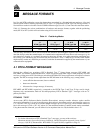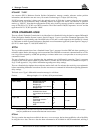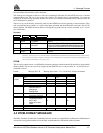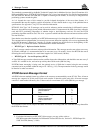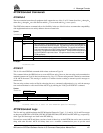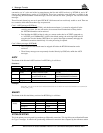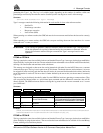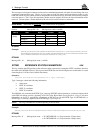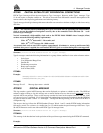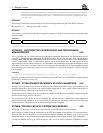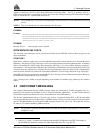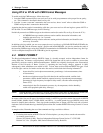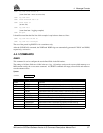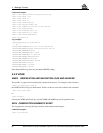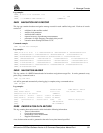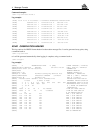
4 Message Formats
MiLLennium GPSCard Software Version 4.50 Command Descriptions Manual Rev 1 53
RTCM9 PARTIAL SATELLITE SET DIFFERENTIAL CORRECTIONS
RTCM Type 9 messages follow the same format as Type 1 messages. However, unlike Type 1 messages, Type
9’s do not require a complete satellite set. This allows for much faster differential correction data updates to the
remote stations, thus improving performance and reducing latency.
Type 9 messages should give better performance when SA rate correction variations are high, or with slow or noisy
data links.
NOTE: The reference station transmitting the Type 9 corrections must be operating with a high-stability
clock to prevent degradation of navigation accuracy due to the unmodeled clock drift that can occur
between Type 9 messages.
NovAtel recommends a high-stability clock such as the PIEZO Model 2900082 whose 2-sample (Allan)
variance meets the following stability requirements:
3.24 x 10
-24
s
2
/s
2
between 0.5 - 2.0 seconds, and
1.69 x 10
-22
T s
2
/s
2
between 2.0 - 100.0 seconds
An external clock such as an OCXO requires approximately 10 minutes to warm up and become fully
stabilized after power is applied; do not broadcast RTCM Type 9 corrections during this warm-up period.
Structure:
(Follows the RTCM Standard SC-104 for a Type 1 message)
Type 9 messages contain the following information for a group of three satellites in view at the reference station:
• Scale factor
• User Differential Range Error
• Satellite ID
• Pseudorange correction
• Range-rate correction
• Issue of Data (IOD)
RTCM9A
Example:
$RTCM9,66516277547C71435D797760704260596876655F7743585D547562716D7
57E686C5258*6D[CR][LF]
RTCM9B
Message ID = 42 Message byte count = variable
RTCM16 SPECIAL MESSAGE
This log contains a special ASCII message that can be displayed on a printer or cathode ray tube. The GPSCard
reference station wishing to log this message out to remote stations must use the
RTCM16T command to set the
required ASCII text message. Once set, the message can then be issued at the required intervals with the “LOG
port
RTCM16 interval” command. If it is desired that only updated text messages be transmitted, then the GPSCard
log interval must be either “onnew” or “onchanged”. The Special Message setting can be verified in the RCCA
configuration log.
The
RTCM16 data log follows the RTCM Standard Format. Words 1 and 2 contain RTCM header information
followed by words 3 to n (where n is variable from 3 to 32) which contain the special message ASCII text. Up to
90 ASCII characters can be sent with each RTCM Type 16 message frame.
Structure:
(Follows the RTCM Standard SC-104 for a Type 16 message)
RTCM16A
This message is the hexadecimal code equivalent of the special message entered using the RTCM16T command.
Example:



